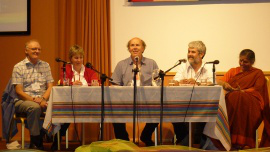NJPN Conference: Our Daily Bread

Panel chaired by John Vidal with Patrick Mulvany, Alison Austin, David Howlett, Vandana Shiva
A candle burned quietly last weekend, throughout a conference on: 'Our Daily Bread: Food Security, People and Planet' at Swanwick in Derbyshire.
More than 400 people gathered for an intensive two days of prayer, lectures, workshops and discussions, at the 32nd Justice and Peace Conference, organized by the National Justice and Peace Network (a body working with the Bishops Conference).
Organizer Ellen Teague said: "Food was chosen as this year's topic, because the global food system upon which we depend is increasingly fragile. One in six people in the world goes hungry and large-scale famine looms again in the Sahel"
The conference explored the food system and new initiatives to help individuals and groups reconnect to sustainable agriculture and food. It also highlighted insights into 'our daily bread' offered by faith and worship.
There were activities for young people and children, a planting ceremony, an art installation, daily Masses and liturgies, and more than one party on the last night in the sprawling conference centre. Food for the event was largely vegetarian and sourced locally.
The conference began on the Friday evening with prayers and reflections on the sacredness of food, led by Pat Gaffney, Diana Mills from Pax Christi and Alastair McIntosh, a Quaker writer from the Isle of Lewis. McIntosh warned that today's society has become 'spiritually blinded by the love of money. The relationships between people and God's earth has been broken and needs mending. "People have become richer, money has replaced relationships. The understanding of where food has come from and whether exploitation took place along the way has been lost," he said, calling for a return to 'virtuous cycles' and 'frugal but fulfilling sufficiency'.
Columban missionary Fr Shay Cullen, spoke of the unjust global markets that are destroying the environment and leaving most people hungry. He went on to report on the fairtrade work of his Preda Foundation in the Philippines, which supplies dried mangoes to British supermarkets, providing livelihoods for smallholders and indigenous peoples.
In a session chaired by Catholic MP John Battle, Elizabeth Dowler, from the University of Warwick, who is a director of the Food Ethics Council and member of the Iona Community, said: "The world comes to us in the UK on a plate" but at huge environmental cost to the planet. The food system is very economically efficient with globalised distribution networks and concentrated ownership all helping to bring efficiency. But she said: "We have cheap food here because other people are paying the price."
She called for more people to support farmers' markets, buy ethically-sourced food and reduce food waste.
Ecologist Vandana Shiva, argued that "biodiverse, orqanic farms and localised food systems offer us security in times of climate insecurity, while producing more food, producing better food and creating more livelihoods".
A food debate on the Saturday evening, chaired by John Vidal, the Guardian's Environment Editor, addressed the subject: 'Feeding the world: What are the roles for small-scale and industrial food production to achieve food security?' Speakers were: Patrick Mulvany, Chair of the UK Food Group; David Howlett from the University of Leeds Africa College who has worked for the British Government's Department for International Development on food and climate change policies; Vandana Shiva and Alison Austin, an independent consultant working with businesses - particularly Sainsburys - to put sustainable development issues at the heart of their activities.
Eco theologian Fr Sean McDonagh, who writes on Christianity and environment and on food and patenting of life, suggested that: "adequate food, justice for people and the continued fruitfulness of the earth are interrelated".
Catholic filmmaker and campaigner Mary Colwell, spoke of the need to protect biodiversity in order to safeguard food security.
A range of witnesses included Victor Barry, an organic farmer from Cornwall; Annmarie Hulley, a catering manager of a Catholic college in Birmingham which is a flagship school of the 'Food for Life' programme, involved in sustainable food sourcing; and Ton Onyango, who works for CAFOD in East Africa and is responsible for their 'sustainable livelihoods' initiatives.
Among 20 workshops there was one led by Mae-Wan Ho, on Genetic Engineering; 'Why People Go Hungry', led by Christine Allen, from Progressio; Victor Barry, an organic farmer from Cornwall; Annmarie Hulley, a catering manager from a college in Birmingham involved in sustainable food sourcing; and Diana Keterregga, a Ugandan refugee who has experience destitution and hunger in Uganda and in England. Deborah Jones from Catholic Concern for Animals on 'Is Meat a Moral Matter?'
The conference was organised by the NJPN Environment Working Group and the Lancaster Diocese Faith and Justice Commission, on behalf of: www.justice-and-peace.org.uk
The picture on the index page shows Tom Onyango from CAFOD. ICN will be carrying more detailed reports on the individual workshops and lectures over the next few days.















